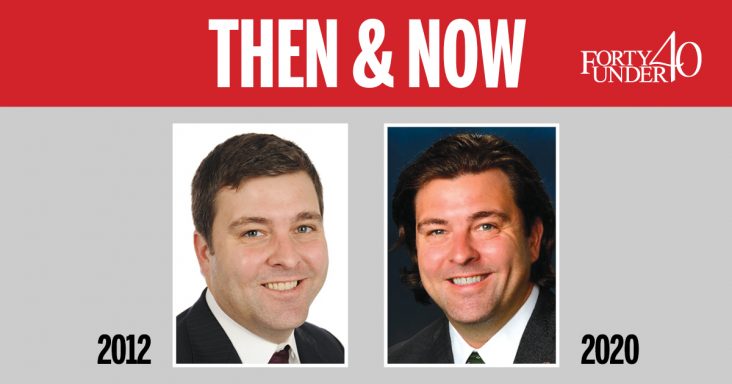Then & Now: Justin Patton leads RFID Lab at Auburn
by January 6, 2021 1:06 pm 1,369 views

Editor’s Note: The following story appeared in the Dec. 21 issue of the Northwest Arkansas Business Journal. “Then & Now” is a profile of a past member of the Business Journal’s Forty Under 40 class.
———————–
Justin Patton, director of the Auburn University Radio Frequency Identification (RFID) Lab, is working with NASA to track inventory for space missions.
The lab has also ensured the safety of football players, coaches and staff at games amid the COVID-19 pandemic. Lab staff installed RFID tags on sideline passes to track everyone on the field and that they’d received a COVID test. Scanners show a picture of the pass-holder when the pass is scanned.
RFID uses a wireless system to transmit data from tags to a receiver to identify and track products. The tags are computer chips placed on products that a scanner can wirelessly identify via radio waves.
Patton, 42, joined the Auburn University RFID Lab as director in May 2014. Previously, the Wynne native had worked at the University of Arkansas RFID Research Center since 2005. That year, Bill Hardgrave founded the center in the Sam M. Walton College of Business.
When the center moved to Auburn, Hardgrave was dean of the university’s Harbert College of Business. Hardgrave, who’s a 2003 Forty Under 40 honoree, became the university’s provost in 2018.
Patton was managing director at the UA’s RFID Research Center when the Northwest Arkansas Business Journal named him to the Forty Under 40 class in 2012.
That year, the research center moved into a 20,000-square-foot facility, about twice its previous building size. The Auburn lab is nearly 15,000 square feet.
After the 2014 move to Auburn, Patton said the lab received broader industry interest, including the aviation and retail industries. Lab sponsors include Boeing, Delta Air Lines, FedEx, Hanesbrands Inc., Intel, Nike, Target and Walmart.
Patton is one of four full-time lab employees. It has between 30 and 40 college students who work on its projects. A 14-member advisory board of industry stakeholders provides financial support and guidance for projects.
RFID technology includes Bluetooth and Wi-Fi technologies. It’s used in digital payment apps, race tags, hotel keycards, concert wristbands and Disney parks passes. The airline industry uses it to track luggage and aircraft parts, while NASA follows items sent to the International Space Station. The technology also tracks hospital pharmaceuticals.
About 20 billion items were equipped with RFID tags in the past year, Patton said, noting that they’re primarily for retail apparel.
One of the research projects he’s excited about has been the NASA partnership, and he highlighted the importance of inventory control. If an astronaut lacked something for a shorter mission, such as to the International Space Station, delivering there would be easier to do than for those on a trek to Mars.
“If you’re going to Mars, and you start running low on food, you’re in big trouble,” he said. “It’s like a camping trip with no safety net and a long one. Inventory control is super important, especially now that we’re tying together all of these different environments in space. And it’s all of these different companies. It’s not just NASA. It’s not just the European Space Agency or Russia. You’ve got private companies. There’s a whole network of inventory control and tracking we’re building outside of the planet. All of that’s got to tie together.”
Patton explained the connection between inventory control for space and air travel. During the pandemic, airline industry business has declined with people concerned about flying. Passengers want low- or no-touch service to limit exposure to germs. And he said better inventory control and tracking can help to maintain safe and sterile environments. He noted the importance of tracking food not only in space but also on international flights on Earth.
The lab has an aviation testing bay that’s being reconfigured from a mock aircraft fuselage into a commercial aircraft cabin. Patton also plans to reconfigure it for a space program. The pandemic has delayed the work, but he hopes to be completed this spring.
His short-term goal is to expand the lab’s reach and embrace other technologies to solve inventory tracking issues. By 2035, he wants everything to have a serialized identity to reduce waste, improve efficiency and mitigate theft.
Patton and his wife, Kris, have two children and reside in Auburn.
